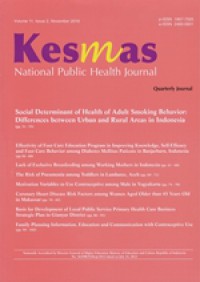
Jurnal
Social Determinant of Health of Adults Smoking Behavior: Differences between Urban and Rural Areas in Indonesia
Indonesia has the highest prevalence of smoking behavior among Southeast Asian countries. This study aimed to determine predictors of smoking behavior between rural and urban areas. Data were taken from The Global Adult Tobacco Survey (GATS). This study used ross-sectional analytical study and multiple logistic regression analysis. Samples were 8,305 Indonesian adults aged ≥ 15 years. The study showed that smokers in rural area were higher than in urban area, respectively 36.8% and 31.9%. Significant predictors of smoking behavior in rural and urban areas were age, occupation, sex, education level, economic status as well as smoking rule inside home. In urban area, age was also significant predictor and otherwise in rural area. The strongest predictor was smoking rule inside home and sex for smoking behavior, either in rural or in urban area. Tobacco control program should be relatively increased by considering the appropriate target population both in rural and urban area due to a little different of smoking behavior path, hence sex perspective should be involved also in tobacco control program. Regulation on smoke-free home should be encouraged to be implemented among houses of community.
Availability
No copy data
Detail Information
- Series Title
-
Kesmas, National Public Health Journal, Vol. 11, Issue 2, November 2016
- Call Number
-
(05) 614 FAK k
- Publisher
- Depok : Fakultas Kesehatan Masyarakat UI., 2016
- Collation
-
Hlm. 51-55
- Language
-
English
- ISBN/ISSN
-
1907-7505
- Classification
-
(05) 614 FAK k
- Content Type
-
-
- Media Type
-
-
- Carrier Type
-
-
- Edition
-
Vol. 11, Issue 2
- Subject(s)
- Specific Detail Info
-
-
- Statement of Responsibility
-
-
Other version/related
No other version available
File Attachment
Comments
You must be logged in to post a comment
 Computer Science, Information & General Works
Computer Science, Information & General Works  Philosophy & Psychology
Philosophy & Psychology  Religion
Religion  Social Sciences
Social Sciences  Language
Language  Pure Science
Pure Science  Applied Sciences
Applied Sciences  Art & Recreation
Art & Recreation  Literature
Literature  History & Geography
History & Geography